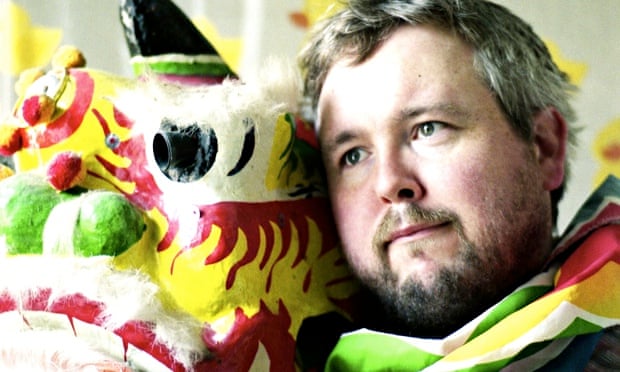Richard Dawson: Geordie songwriter who found a voice in his local library
Singer says his eye condition means he sees things differently – and, when you hear his music, what he’s saying makes sense

At a time of year when the music industry is fixated more than ever on commerce – generating buzz for its priority acts for the forthcoming year, shifting vast piles of box sets and mass market albums to Christmas gift buyers – there is something heartening about the slowly rising profile of Richard Dawson.
The 33-year-old Geordie singer-songwriter released his album Nothing Important last month, to a level of acclaim that would surely have seen it featuring on end-of-year lists all over the place had it come out a little earlier.
It is a far cry from the other male singer-songwriters who have featured in success stories this year, though – there’s nothing of Ben Howard or George Ezra or Hozier about Dawson.
Nothing Important contains just four songs: two instrumentals either side of two 16-minute songs, the title track and The Vile Stuff, which offer long, impressionistic, hugely detailed and sometimes disturbing reveries of childhood. It’s an extraordinary record: a strange, discordant reconfiguration of English folk traditions.
“It’s not folk music,” says Dawson, sporting those great signifiers of folk music – a beard and a cable knit sweater – over a cup of tea on a December morning. “I call it ritual community music, and I’m more interested in experimental music.”
He points out its links to Tuvan throat singing, enthusing about an album called 60 Horses in My Herd, to heavy metal, to the ritualistic patterns of African music.
And he blames the folk tag on his previous album The Glass Trunk, the one that lifted him from regional obscurity to national obscurity, which was based on material he found in the archives of the Tyne & Wear Archives and Museums, and featured a lot of a cappella singing.
Before that, he says, “I was writing love songs, but I don’t know much about that topic, and it was disastrous.”
Dawson is partially sighted – he and his brother Iain, a world champion paratriathlete, both have a genetic eye condition called X-linked juvenile retinoschisis – and he says that has hugely informed his music.
On a practical level, it meant he qualified for working tax credits, which enabled him to spend more time on his music. At a more metaphysical level, it means “faces take a long time to come into form, and there are some interesting hallucinations. You almost have a head start in seeing things as blurred, because it’s important not to be black and white about things.”
He points to the edge of the table we’re sitting at, and explains that while I’m seeing it as a crisp line, to him it’s something much softer.
When you hear his music, what he’s saying makes sense. There’s an almost hallucinatory clarity to his writing.
The Vile Stuff tells of a disastrous year seven school trip to Featherstone Castle, “and some poor wee scallywag’s brung/ A Coca-Cola bottle containing a spirit” – the titular Vile Stuff.
One boy gets into bed with a female teacher, “much to the chagrin of the deputy headmaster/ Whose scarlet skull is firmly wedged between her thighs”.
There are multiple injuries and a “no-win, no-fee solicitor/ Thinking of relocating to a Buddhist monastery in Halifax”.
It’s all, Dawson says, sort of true. “It was a pretty disastrous trip, I’ll say that. But a little scratch might become a cut, and a cut might become a wound …”
But trying to write honestly about real lives across The Glass Trunk and Nothing Important brought its own demands.
“You’re dealing with other people’s stories and you have a duty to do right by that. But part of that duty also involves being creative.”
Dawson’s ears were opened to the possibilities of music not by questing parents, but by the local library. That was where he found the jazz albums that encouraged him to move on to experimental music and improv; it was where he heard the Ali Farka Touré album that “opened a whole can of worms”; it was where he first listened to classical music.
All that feeds into his own musical celebration of the north-east, whose characterisation as a land of “humble worker bees” he disdains.
“There’s a really crass side to it, which is the side flagged by Sting, for instance. I don’t want to be in the business of calling other musicians, but I think I’m on safe ground with Sting.
“He has written a disgusting musical; it’s really bile-making – he’s singing in this cod Geordie accent. Arts money is pumped on to vast projects which supposedly celebrate [Newcastle], but it’s the same things they’re rolling out – these overplayed, trite Geordie accents.”
In recent months, Dawson has appeared on the cover of The Wire magazine, and been celebrated at length by The Quietus website, which would tend to mark him out as a maker of “difficult music”. It’s odd and disquieting, certainly, but also beautiful in its strangeness.
“I aim to be as accessible as possible, for sure,” he says. “But it has to be what it has to be. I think about symmetry a lot, the notion of reflection – but a broken mirror making a slightly distorted reflection.”
And what does his family make of it all? He laughs gently. “My dad came to the launch gig. He left halfway through to get the last train.”
No comments:
Post a Comment